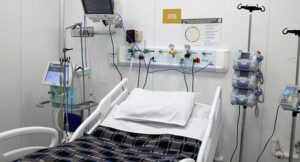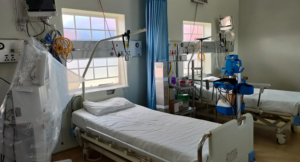A300-bed Christian hospital in Eswatini has largely stopped seeing patients. Staffers at a Christian maternity clinic in Côte d’Ivoire are watching HIV drugs rapidly disappear from their shelves and do not know where to acquire more even if they can raise money for them. Students at a Christian nursing school in Malawi lost the scholarships that helped them afford tuition and meals.
In the month since President Donald Trump’s executive order freezing foreign aid shuttered the US Agency for International Development (USAID), lifesaving care mostly remains cut off around the world, despite court orders and promised waivers.
Across Africa, hospitals, clinics, and nonprofits have scrambled to raise or redirect money on their own, but administrators know emergency fundraising isn’t a reliable way to cover operation costs. In the short term, many just want to keep vulnerable patients on tuberculosis medicine or antiretroviral drugs (ARVs) for HIV, or keep their staffs paid.
Programs on the ground reported to CT that they have not received any new disbursements from USAID and can’t get answers from the US government about if or when funding will resume.
Over the weekend, the Trump administration placed almost all USAID staffers on leave and fired at least 1,600. Even if the State Department were to absorb some of USAID’s work, as the administration has outlined, it’s unclear how billions of dollars’ worth of programs would be resumed and overseen without staffing.
In Tanzania, a Christian clinic treating 300 children with HIV had to put USAID-funded staff on leave and has been scouring for funds to cover ARVs for its young patients, whose immune systems are particularly vulnerable without drugs to keep HIV at bay.
The clinic is part of Shirati Hospital, historically a Mennonite mission hospital. Dale Ressler, an American, serves as executive director of Friends of Shirati, which raises private donations for the hospital.
Ressler has been in touch with the doctor in charge of the clinic about how to keep medicines going for the children. In the past few weeks, Ressler was able to raise $10,000 for ARVs, he said. But the medicines are hard to find, with supply chains broken by the USAID shutdown.
The $10,000 should be enough for three weeks of treatment for its patients. Still, Ressler said staff members at the clinic were preparing to talk to the children about the possibility of the drugs running out.
“Some of the smaller ones won’t necessarily understand,” Ressler said. “Children 12 and up will know the risks. They’ve been told every month their whole life, ‘If you don’t take [the medicine], you’ll die.’”
Certain projects around the world received waivers to continue operating despite Trump’s stop-work order—particularly HIV testing and drug distribution through the President’s Emergency Plan for AIDS Relief (PEPFAR).
Yet none of the HIV treatment programs contacted by CT said they had received funds since then, so groups that proceed must do so in good faith, hoping the US government will pay them for the contract work.
The New York Times reported that Phoenix, the system for disbursing money to partners in the field, remains shut down, and the acting USAID administrator has argued in court that the ongoing freeze in funds is justified.
Reuters exclusively reported last week that the administration had approved $500 million in PEPFAR funding, but if that money is coming, it hasn’t made it to many health facilities yet.
The funding freeze has halted operations at The Luke Commission (TLC) hospital in Eswatini, a small landlocked nation in Southern Africa. A 300-bed Christian hospital with about 700 employees, TLC specializes in surgeries and critical care and treats HIV, tuberculosis, and snakebites.
The Christian hospital— whose services are free to patients—leans heavily on USAID, with about $7 million of its $21 million budget coming from the US government, according to the latest tax filings. Consistent aid payments helped when other sources of funding were unpredictable, said Echo VanderWal, executive director of TLC.
“If I could describe [USAID] for us in two words, it would be ‘faithful friends,’” said VanderWal in an interview. When other parts of the health care system shut down during the pandemic, the USAID country director called VanderWal every day to ask how the hospital was doing.
But VanderWal thinks a shakeup of US aid could be good. She has seen how projects from US agencies and other foreign aid can be redundant or feed corruption.
“The need for accountability and transparency and integrity in global aid is long overdue,” she said. “I’m devastated that it’s happening like this.”
TLC leaders asked its US donors if it could redirect funds to tuberculosis and HIV medicines so patients wouldn’t lose access to the lifesaving drugs. Since the USAID shutdown, the hospital is mostly doing drug refills. The hospital has laid off some staff members, and others aren’t getting full salaries.
The COVID-19 pandemic left the facility in financial straits. During the pandemic TLC had a heavy patient load and made a significant investment in an oxygen plant. As a result, the hospital had already reduced some services before the USAID cut.
“I do not believe that America is going to give nothing to foreign aid,” VanderWal said. “I believe they are going to invest in a continued legacy of compassion to the world. … Possibly it’s going to be structured differently. I sure hope so.”
The frozen aid may have eliminated some wasteful programs, but it also cut PIM, a Christian maternity clinic in Côte D’Ivoire, specializing in mothers and children with HIV. The clinic treats 5,800 patients, according to Kip Lines, executive director of CMF International, a Christian mission organization in the US that supports PIM. The HIV medicine keeps a pregnant mother from passing the virus to her baby.
Run by Ivorians, the clinic was part of PEPFAR and received USAID funding. It had a signed contract with USAID through 2025 and was not prepared for the freeze.
The ARV distribution network in Côte D’Ivoire also shut down with the freeze, said CMF’s Lines. (CMF does not receive USAID funding.)
Without the network, the clinic isn’t sure where to procure ARVs.
“Even if the State Department said today, ‘Yes, we’re re-funding this program,’ none of the organizations that received the USAID funding locally are in operation,” Lines said. “They let their staff go. The offices are closed.”
CMF reached out to ACONDA VS-CI, the organization that oversees drug distribution, and got no response. ACONDA’s social media presence halted in late January, with its last post a recruitment for staff to fight HIV. CMF’s staff on the ground said the organization had shut down. ACONDA did not respond to an inquiry from CT.
When HIV funding disappeared in January, CMF asked US churches to raise money for the clinic’s operating costs, particularly the salaries of clinic staffers who would have to be laid off otherwise.
Churches responded by supporting the salaries in the short term, but the bigger fundraising need going forward is for the ARVs, which cost about $30,000 a month, if the clinics can acquire them.
Last week CMF was able to send $10,000 for ARVs to PIM, and Lines said the clinic was “buying them wherever they can find them.”
The emergency funding is helpful, but Lines wonders: If PEPFAR isn’t operational again in a few months, will PIM have to shut the clinic down?
In some places, the funding freeze is threatening efforts to make countries less dependent on foreign aid.
Malawi, one of the poorest countries in the world, has long struggled with a shortage of health care workers. It has among the world’s lowest numbers of nurses per capita.
In recent years, USAID sponsored a scholarship to support nurses-in-training at Nkhoma Hospital, a rural mission hospital now run by Malawian Christians.
Most of the 350 students at Nkhoma College of Nursing and Midwifery pay their own tuition, but a USAID scholarship program supports a cohort of 20 nurses who need assistance. Some are the children of subsistence farmers, the first in their families to attain this level of education.
These 20 nurses were halfway through their three-year education when the funding freeze hit last month. The students were ready to start their semester, but the school received word that they would receive no funds for their tuition or their room and board.
The students were crying, saying they had nowhere to go, said multiple staffers at the school. Food is scarce now because it’s the time of the year Malawians call “hunger season.” Proceeds from a previous year’s crop are dwindling, and the next season’s maize crops aren’t harvested until May.
“Students, they cannot go home and say, ‘Give us maize and give us some food,’” said Rose Mazengera, one of the Malawian administrators at the nursing school. At the hospital, the doctors see more children with malnutrition during this season.
Nkhoma Hospital is already stretched thin serving a poor rural population and did not have money to cover the students’ fees and food.
In one letter to the school, reviewed by CT, a nursing student asked for a few months to pay his tuition, saying he had planted maize and would be able to harvest it in May in order to pay the school by June. “This is my only source of getting the fees,” he wrote.
In desperation, the school’s leaders sent a request to African Mission Healthcare, a foundation that has supported mission hospitals, to help keep the nurses in school. The foundation agreed to cover this semester of tuition for the 20 nurses.
But the school’s administrators don’t know if that support will continue. Before the shutdown, US government support felt reliable.
The freeze “came to us as a surprise and a shock,” said Newton Kamchetere, another nursing school administrator. “If their training is interrupted or curtailed, in the near future we will have deficiencies in terms of health care workers. … It will have a huge impact in the long run.”
It’s a compounding crisis too: Some nursing students who weren’t receiving the scholarship relied on family members working on USAID-supported projects to help pay their tuition.
“We are always grateful for the things the US government has been doing in Malawi … especially with HIV,” Mazengera said. But she expects the funding cuts will increase the mortality rate for children under 5 years old, a key health indicator.
“I’m just hoping and praying some of these things can be reversed,” she added. “It is a thing which needs God’s intervention.”
Last week in Nkhoma Hospital’s daily chapel, Kamchetere delivered the message and talked about Paul’s words in 1 Corinthians 12:26 about the church as a body.
“When the other part of the body suffers, we should all be concerned—we need to help one another. I have seen that working,” Kamchetere said. “May the good Lord open other doors so at the end of the day we will alleviate the poverty and suffering.” Christianity Today









